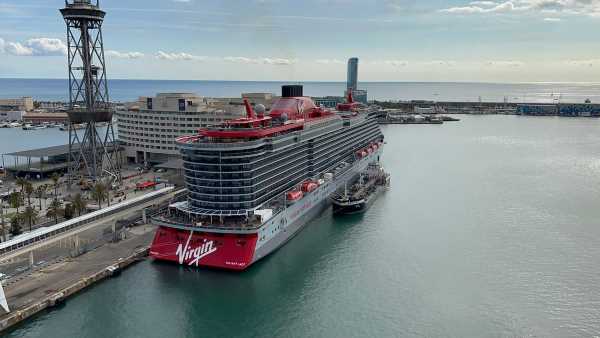Barcelona, Europe’s busiest cruise port, this week will put into effect a ban on passenger ships from its central cruise terminal, Muelle Barcelona Norte, a change five years in the making that echoes moves by other major European cities to disassociate city centers and cruise ships.
The change will be felt by passengers on midsize and small ships from lines such as Azamara, Oceania, Regent Seven Seas and Virgin Voyages, which will now have to dock at piers south of the city center, primarily Moll Adossat, where large cruise ships already berth.
But travel advisors took the Barcelona cruise port shake-up in stride, saying they don’t expect it to have a major impact on the visitor experience.
“Although it was convenient to be in the city center in Barcelona, the distance from Moll Adossat terminal to the main tourist area of Barcelona, such as La Rambla, is only a 20-minute shuttle ride,” said Michelle Fee, founder and CEO of Cruise Planners (No. 20 on Travel Weekly’s 2023 Power List).
Fee added that her company was “sensitive to the overtourism that is happening in some European cities.”
James Cole, founder and CEO of Austin, Texas-based travel retailer Panache Cruises, said that Barcelona is not the first or only European city rethinking how to handle cruise ship traffic.
“There are a number of cities across Europe that are looking at ways to accommodate the growing number of cruise ships, and as always the cruise lines will work hard to accommodate what is required by the local planning authorities,” he said.
Among them are Venice, which in 2021 approved a ban on cruise ships in its city center after a yearslong campaign, and Amsterdam, where city leaders this summer voted to relocate the centrally located cruise terminal, citing concerns about air pollution and overtourism.
Cole does not anticipate the changes in Barcelona to detract from the city experience.
“It’s disappointing that cruise ships will no longer be able to dock at the more central dock in Barcelona, as clearly it was a more convenient way for passengers to access the center of the city,” he said. “However, given there is an alternative dock, we don’t anticipate that it will cause too much disruption, and Barcelona will continue to be a great port for both embarkation and disembarkation.”
Marisel Aleman, vice president of Cruise Elite in Ormond Beach, Fla., pointed out that cruisers are used to not always being able to berth directly in European ports and that cruise ships, especially larger ones, often dock away from city centers.
“It is a matter of setting expectations at the time of booking and as they are exploring sightseeing options,” Aleman said. “Many ships actually depart from Barcelona, thus that just means a taxi ride. It is all a matter of communication with the clients.”
A changing Barcelona
The change has been in the works since a 2018 agreement between city officials and the Port of Barcelona to reduce ship emissions in the city center. Cruise tourism to the city has grown significantly since then, with the port becoming Europe’s busiest for cruises, according to CLIA, with 2.5 million passengers per year.
The Barcelona Norte port closure to all passenger ships, ferries included, will result in a shift of 340 cruise and ferry calls a year to the Adossat wharf.
In 2026, the Barcelona South terminal, where about 70 ships call annually, will also close, concentrating all cruise operations at Adossat, a move that requires an investment of more than $283 million, including installation of shore power to reduce emissions.
According to CLIA, shore power will be available by 2026. The organization also said the industry has helped improve cruising’s impact on the city via the Port of Barcelona’s Cruise Sustainability Council, of which CLIA is a member. CLIA’s participation meant that its members had ample time to adjust.
The city plans to repurpose the port in the city center as an open area for the public, providing about 45,000 square feet of public spaces.
Cruise is not the only form of travel targeted by Barcelona in its quest to combat overtourism and reduce noise pollution. In 2022, it capped the size of tour groups in the city center at 30 and banned the use of megaphones on tours.
Andrea Zelinski contributed to this report.
Source: Read Full Article


